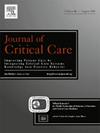脓毒症相关急性肾损伤的液体处理
IF 2.9
3区 医学
Q2 CRITICAL CARE MEDICINE
引用次数: 0
摘要
脓毒症相关急性肾损伤(SA-AKI)对危重患者的发病率和死亡率有显著影响,因此需要循证的液体管理方法。了解SA-AKI的病理生理学和充分的液体复苏和预防液体过载之间的微妙平衡,对于提供这些患者的最佳管理至关重要。这篇综述强调了液体治疗的各个阶段,SA-AKI的液体管理策略,不同阶段首选的液体类型,以及药物和机械方法的液体清除。针对特定患者亚群(包括脓毒性心肌病或慢性肾病患者)量身定制个性化策略的应用仍然具有挑战性。一个主要的限制是,大多数液体研究是在一般的危重患者中进行的,而不是在SA-AKI患者中进行的。未来的研究是必要的,以研究液体管理,特别是在SA-AKI,完善治疗方案和指导管理,以改善患者的结果。本文章由计算机程序翻译,如有差异,请以英文原文为准。
Fluid management in sepsis associated acute kidney injury
Sepsis-associated acute kidney injury (SA-AKI) significantly contributes to morbidity and mortality in critically ill patients, necessitating an evidence-based approach to fluid management. Understanding the pathophysiology of SA-AKI and appreciation of the delicate balance between adequate fluid resuscitation and prevention of fluid overload, are essential to deliver optimal management of these patients.
This review highlights the phases of fluid therapy, the strategies for fluid management in SA-AKI, the types of preferred fluids in different phases, and both, pharmacologic and mechanical methods of fluid removal. The application of individualised strategies tailored to specific patient subsets, including those with septic cardiomyopathy or chronic kidney disease remains challenging. A major limitation is that most fluid studies were conducted in critically ill patients in general, rather than patients with SA-AKI. Future research is imperative to study fluid management specifically in SA-AKI, refine therapeutic protocols and guide management to improve patient outcomes.
求助全文
通过发布文献求助,成功后即可免费获取论文全文。
去求助
来源期刊

Journal of critical care
医学-危重病医学
CiteScore
8.60
自引率
2.70%
发文量
237
审稿时长
23 days
期刊介绍:
The Journal of Critical Care, the official publication of the World Federation of Societies of Intensive and Critical Care Medicine (WFSICCM), is a leading international, peer-reviewed journal providing original research, review articles, tutorials, and invited articles for physicians and allied health professionals involved in treating the critically ill. The Journal aims to improve patient care by furthering understanding of health systems research and its integration into clinical practice.
The Journal will include articles which discuss:
All aspects of health services research in critical care
System based practice in anesthesiology, perioperative and critical care medicine
The interface between anesthesiology, critical care medicine and pain
Integrating intraoperative management in preparation for postoperative critical care management and recovery
Optimizing patient management, i.e., exploring the interface between evidence-based principles or clinical insight into management and care of complex patients
The team approach in the OR and ICU
System-based research
Medical ethics
Technology in medicine
Seminars discussing current, state of the art, and sometimes controversial topics in anesthesiology, critical care medicine, and professional education
Residency Education.
 求助内容:
求助内容: 应助结果提醒方式:
应助结果提醒方式:


